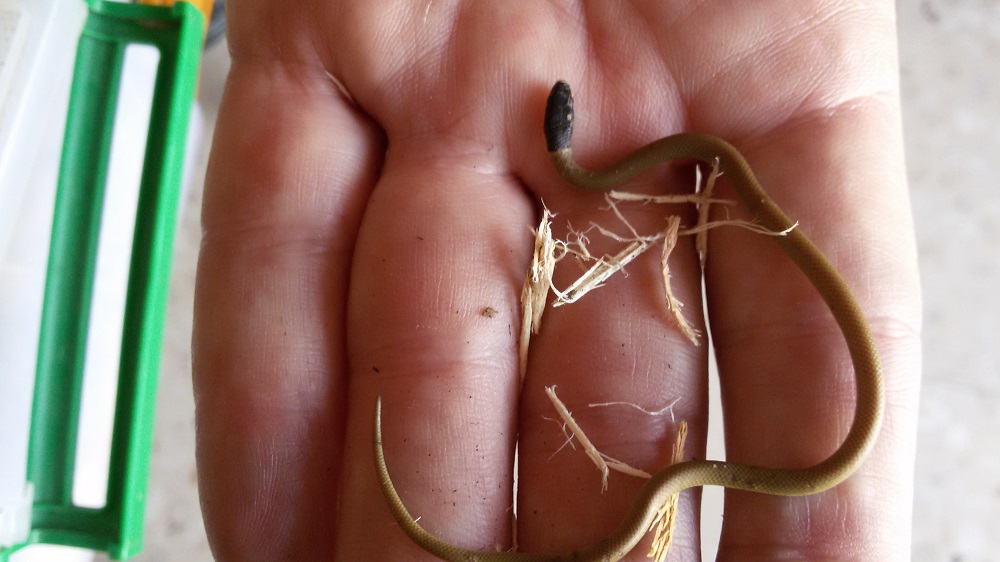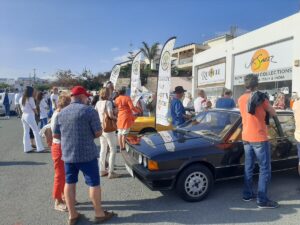By Bejay Browne
A Paphos based Austrian snake and reptile expert has found a rare species of dwarf snake that needs further scientific testing to reveal its origins, five years after it’s initial sighting.
Hans-Jorg Wiedl, ‘Snake George’, 75, is well known in the field of herpetology and has a string of triumphs to his name including rediscovering the Cyprus grass snake, which was believed to have been extinct for the last 40 years and proving that the blunt nosed viper lays eggs and doesn’t give birth to live young as had previously been thought.

He told the Paphos Post that after the third sighting, he believes the black headed dwarf snake to be an endemic sub species of the Rhynchocalamus Melanocephalus, or perhaps a totally new find.
He noted that it’s non venomous snake and not at all dangerous to humans.
The tiny, thin snake was found by a British couple in a stone wall in their garden in Peyia. They contacted the herpetologist through his daughter Demetra, as he was abroad.
“We were very lucky, I have had to wait five years to see this snake again and its thanks to them. They saw it three or four times but were not able to catch it, because its so fine and delicate, you can’t just take with fingers as you don’t want to hurt it,” said Wiedl.
He said that he has carried out much research into the tiny snake, and that a similar one, is endemic to the East Mediterranean. It has been found in Turkey, Syria and Israel, he said.
“I checked and looked to see if the markings and the colour are the same and recognised that it is similar to the one from Israel.”
However, he said there are some small differences, such as the colour of the body and markings on the head.
Wiedl explained that there need to be three sightings of a snake alive to be able to prove its existence, a single example is not evidence. To prove that this is a new species, DNA identification, research, findings and examples of the snake must be identified and then it can be registered as a new species in Cyprus.
“I am very excited, this could be a completely new snake or sub a species. We need DNA samples which unfortunately I cannot do and I hope that they can be taken and that Cyprus would get in touch with the University in Israel to see if they have some examples to compare DNA.”
He added that he would be pleased if a scientist would come forward with the aim of carrying out research into the snake.
Five years ago, he discovered the first tiny snake after he was contacted by a British resident in the Paphos district, who had examined a book Snake George has written on the snakes of Cyprus and hadn’t been able to identify the creature.
“There are so many questions that need to be answered, how did it come to be here. The snake so tiny that this could be a reason why it wasn’t found. It mainly lives in small cracks in rocks as it is more safe for them, not even a mouse is able to get inside,” he said.
Wiedl was stumped as to how the dwarf snake, measuring about 11 cms had ended up in Cyprus, as he believes that it is practically impossible that the creature was transported to Cyprus in someone’s luggage or by other means as she was so young.
The second one was found by a British tourist last year, who sent photos to the local media and wrote that he found it in the Paphos district. But he released it after taking the photographs, so Wiedl was unable to view it himself.
The third snake was found around one month ago and was looked after by Demetra until her fathers’ recent return from Austria. He praised his daughter as unable to return immediately due to a family tragedy, he wanted to be sure that the pair saved its life.
“My daughter made a wonderful habitat, I gave her some ideas. I am happy the snake is happy and that she is alive. It is very hard to tell if its male or female, I don’t know. I want to find out and there are ways. I have no idea how old it is, but its growing bigger.”
Wiedl, a pioneer herpetologist in Cyprus is also keen to be involved in establishing a new snake and reptile park in Paphos to help protect species, highlight their existence and educate both children and adults. He previously operated a successful venture in Peyia for many years, which saw thousands of locals and tourists visit each year.
For the last years, he has mentored a young Cypriot, taking him on field excursions and passing on his vast knowledge.The young man then went on to study in Greece. He aims to open a new park with the advice and huge amount of knowledge and experience supplied by Wiedl.
“It was my dream to find a Cypriot who has the same feelings as me to protect amphibians and reptiles of Cyprus and I found Andreas. I would help him for the rest of my life.”
However, recently the pairs hopes were dashed as the ministry of agriculture refused permission for the young Cypriot to start a Paphos park, stating instead that there are plans to build an amphibian park in Neo Chorio.
His supporters are hoping the new snake, at least, will be named after Wiedl.
“I am very excited about this latest discover, this is my life,” he said.
Snake George: 99 987685






